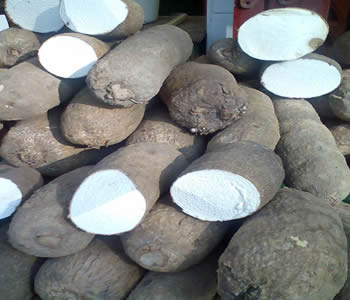
YAM FACTS
YAM is the common name for some species in the genus Dioscorea (family Dioscoreaceae). These are perennial herbaceous vines cultivated for the consumption of their starchy tubers in Africa, Asia, Latin America and Oceania. There are hundreds of varieties among the cultivated species. These include:
Dioscorea rotunda, the "white yam" and Dioscorea cayenensis, the "yellow yam", native to Africa. They are the most important cultivated yams. In the past, they were considered two separate species but most taxonomists now regard them as the same species.
There are over 200 cultivated varieties between them.
Yams are high in Vitamin C, dietary fibre, Vitamin B6, potassium and manganese; while being low in saturated fat and sodium.
Yams are a good source of Vitamin B6. Vitamin B6 is needed by the body to break down a substance called homocysteine, which can directly damage blood vessel walls. Individuals who suffer a heart attack despite having normal or even low cholesterol levels are often found to have high levels of homocysteine. Since high homocysteine levels are significantly associated with increased risk of heart attack and stroke, having a good supply of vitamin B6 on hand makes a great deal of sense. High intakes of Vitamin B6 have also been shown to reduce the risk of heart disease.
Yams are a good source of potassium, a mineral that helps to control blood pressure. Due to the fact that many people do not only not eat enough fruits and vegetables, but also consume high amounts of sodium as salt is frequently added to processed foods, they may be deficient in potassium. Low intake of potassium-rich foods, especially when coupled with a high intake of sodium, can lead to hypertension.
Yams do contain some unique substances called steroidal saponins and among these substances are chemicals called diosgenins. Because of similarities between diosgenin and progesterone, questions were initially raised about the ability of our body to convert diosgenin into progesterone, but research has shown that the answer here is clearly no. Diosgenin does, however, have an impact on hormonal patterns in studies involving animals, and may be helpful in lowering risk of osteoporosis, although we don't as yet have any human studies in this area.




